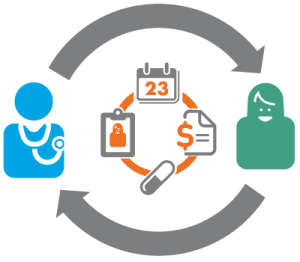 For all professionals who work in health care, proper engagement of patients in their health care is very important. Having patients with a stake in the quality of their health care is the key to getting better outcomes, fewer visits to the ER and fewer trips to the hospital.
For all professionals who work in health care, proper engagement of patients in their health care is very important. Having patients with a stake in the quality of their health care is the key to getting better outcomes, fewer visits to the ER and fewer trips to the hospital.
It is very easy to see who an engaged patient is. He or she does what the health care provider says, and does what their health care team says they should do for the best health outcome.
But isn’t it true that being engaged in your health care really depends upon what your perspective is?
You see, everyone defines what health is based upon what is happening in our own lives, and in our own particular way. All people have different levels of satisfaction with their health care, and what they consider to be good health.
SEE ALSO: 30+ Free Online Patient Safety Courses – Certificates & Credit Available
There are certain patterns of health care that we can use to better segment various health care populations. One such pattern is to put a top priority on having a very high level of good personal health. Another is to be proactive as far as maintaining that good health, and another issue is when people do not trust their medical professional.
It is not a surprise that people who have such a pattern of thinking about health care will usually go to doctors’ offices less often, as well as the hospital and ER. This will drive lower health costs. These people are also the most healthy when they are compared to other patterns of thinking about health. Because these patients have trust issues with their doctor, they tend to be mavericks and like to do their own thing to stay healthy. So, they are not the most compliant patient and will tend to be more unengaged from their health care professional.
YouTube Special Feature
What is Patient Engagement? | Center for Advancing Health. Patient engagement in health care consists of the actions we take to benefit from that care.
But people can be very engaged in their health and health care and not go to a doctor or go to the hospital. It is not necessary for a person to see a doctor every other month for he or she to be fully engaged in their health care.
If you tell these people who are healthy but independent that they are not fully engaged in their health, they would probably be skeptical. They might say something like, doctors don’t understand my perspective so what do you expect? Actually, isn’t it true that such people are doing a better job than the medical and health fields when it comes to being engaged and keeping in good health?
The point here is that people in the health profession need to look at different definitions of health, health goals, outcomes and compliance. It is necessary to incorporate the perspective of the patient in the outcome and the measures of satisfaction. Only at that point do health care providers have any right to judge if the patient is fully engaged.
It is important for the healthcare industry to get past this attitude that they know best. Only then can we really expect to see major changes in both health behavior and outcomes.










